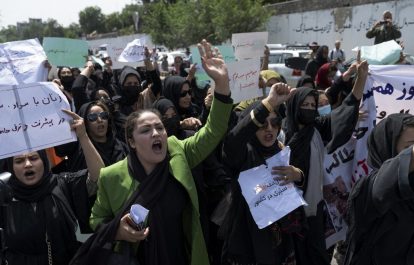Press Statement
Afghanistan: Regional unions call for international solidarity to support Afghan journalists
15 Aug, 2022
Since the Taliban assumed control of Kabul on August 15, 2021, Afghanistan’s media has faced one of its bleakest years in history, with a dramatic increase in media rights violations and a host of new media restrictions, all contributing to a rapidly deteriorating economic situation for Afghan media workers.
Although Taliban leaders declared their supposed intent to respect press freedom and women’s rights during their first press conference on August 17, 2021, the ensuing wave of attacks, harassment, intimidation, killings, legal restrictions and shuttering has proven otherwise.
According to the United Nations Assistance Mission in Afghanistan’s (UNAMA) report, a totalof173 media rights violations have been documented in Afghanistan from August 15, 2021, until June 15, 2022. Among these violations were 122 incidents of arbitrary arrest and detention, 58 instances of ill-treatment and 33 instances of threats.
The UNAMA report highlights the Taliban’s crackdown on public dissent by curbing protest activities and attacking the nation’s media, journalists and civil society leaders. attacking media, journalists and civil society leaders. A recent survey by an affiliate of the International Federation of Journalists (IFJ) estimated that approximately 86 per cent of these violations were perpetrated by the Taliban
An economic crisis has devastated media organisations, with a Deutsche Welle Akademie article finding that an overwhelming majority of media houses have reported state repression and financial challenges. Local media report that journalists have been forced to find alternate employment, working in agriculture, trading food on the street and performing daily wage labour.
Women journalists have been regularly prevented from carrying out their work, facing gender-based violence and economic insecurity. On May 19, the Taliban’s so-called ‘Ministry for the Propagation of Virtue and the Prevention of Vice’, issued a decree to women broadcasters to cover their faces while on-air, a rule termed ‘final and non- negotiable’.
On September 19, 2021, the interim director of the Government Media and Information Centre (GMIC) announced 11 new media regulations for Afghanistan’s media industry, which have been used to arbitrarily censor broadcast content, restrict press freedom and arrest journalists and media workers. Self-censorship is now widespread due to the fear of the consequences of holding the Taliban to account.
SAMSN remains gravely concerned that more must be done to accommodate Afghan journalists and media workers and called on international governments and organisations to:
- Provide increased humanitarian assistance to journalists experiencing unemployment and economic hardship as a result of the Taliban regime.
- Offer international support to help sustain media, pay journalists and lobby for greater access to information and the safety and protection of media workers.
- Increase humanitarian emergency visa programs, ease visa requirements, expand resources for handling asylum applications and provide further support and resources for resettlement schemes for Afghan journalists and media workers.
The SAMSN said: “Reiterating its solidarity with all Afghan journalists and media workers, SAMSN calls on the international community to take immediate action to address the deteriorating state of freedom of expression and press freedom in Afghanistan. More must be done to ensure the safety and security of those journalists who remain in the country, with substantial additional support and further humanitarian programs required to accommodate those in exile.”
SAMSN members
- Afghan Independent Journalists Association (AIJA)
- Afghanistan National Journalists Union (ANJU)
- Federation of Media Employees Trade Unions (FMETU)
- Federation of Nepali Journalists (FNJ)
- Free Media Movement (FMM)
- Indian Journalists Union (IJU)
- Journalist Association of Bhutan (JAB)
- Maldives Journalist Association (MJA)
- National Union of Journalists, India (NUJ-I)
- Nepal Press Union (NPU)
- Pakistan Federal Union of Journalists (PFUJ)
- Sri Lanka Working Journalists Association (SLWJA)
Written By
 IFJ Asia-Pacific
IFJ Asia-Pacific
The IFJ represents more than 600,000 journalists in 140 countries.
For further information contact IFJ Asia-Pacific on +61 2 9333 0946
Find the IFJ on Twitter: @ifjasiapacific
Find the IFJ on Facebook: www.facebook.com/IFJAsiaPacific
Comments
Resources
- IFJ South Asia Media Bulletin, February 2023 02/15/2023 Download
- IFJ South Asia Media Bulletin, January 2023 01/18/2023 Download
- Nepal Press Freedom report 2022 01/03/2023 Download

